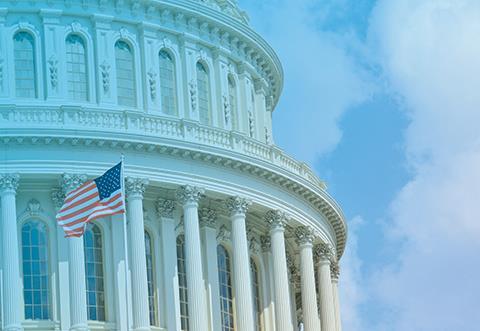By Gregory Hershman, Head of US Policy, PRI

While - at the time of writing - some races remain uncalled, the results of the 2024 US elections are broadly known: in January, President-Elect Donald Trump will once again take the helm of the US federal government. The Republican Party will take control of the Senate and retain control of the House of Representatives. Across the states, few elected offices changed between parties, though Republicans broadly outperformed their Democratic competitors.
Given the previous Trump Administration’s pivot away from issues such as climate action – and the more recent pushback we’ve seen against the concept of “ESG” – we understand that signatories may have questions about how the incoming administration’s policy priorities will impact them and the PRI’s ongoing work.
For nearly 20 years the PRI has worked around the world with business leaders and governments across the political spectrum to best support our signatories. Our work has always been apolitical and non-partisan, guided by the needs of our 5,000+ signatories across nearly 100 countries. This work will not change. We will continue to engage with administrative and elected officials, regardless of party affiliation, who work on issues relevant to our signatories and the broader work of the PRI.
For nearly 20 years the PRI has worked around the world with business leaders and governments across the political spectrum to best support our signatories.
The PRI’s work has always been underpinned by a core concept: that engaging in responsible investment practices helps signatories better do their work on behalf of clients and beneficiaries. The uptake of responsible investment across the global financial industry has been driven by sound business practices and investment fundamentals.
In turn, the work of the PRI is focused on helping the industry to identify, assess, and address material risks and opportunities across environmental, social, and governance factors and deliver results on behalf of clients. Responsible investment, therefore, is not only aligned with the demands of fiduciary responsibilities, but is driven by them.
Policy needs of responsible investors remain the same
Our policy work will always be designed to reduce barriers to responsible investment and enable signatories to act on the Six Principles while fulfilling their fiduciary duties. Regardless of political cycles, the PRI has and will continue to be clear that the policy needs of responsible investors remain the same:
- Clarity from regulators and lawmakers on the freedom of investors to make the best decisions for their clients and beneficiaries.
- Access to consistent, comparable, and decision-useful information on risks and opportunities important and material to the investment decision-making process, including factors that are traditionally not easily captured on a balance sheet but have tangible financial consequences, like extreme weather, political instability, and natural resource limitations.
- Clear, unobstructed channels to utilise the full spectrum of the rights of shareholders to support investee companies via a long-term lens consistent with the needs of signatories holding long-term, patient capital.
- Incentives aligned with a just transition to a sustainable economy. The Inflation Reduction Act was an historic investment in American innovation through clean technologies and continues to crowd in private investments in communities across the country.
- Alignment across levels of government that reduces friction and supports efforts to adapt to market changes.
- Removal of misaligned policy or regulation that disincentives sustainable activities and only serves to add costs to market actors.
Protecting American pensions and investments
An enabling policy environment can support the goal of protecting the hard-earned pensions and investments that American workers rely on to lift up their families and retire with dignity. Emergent risks continue to challenge these shared efforts, though. As communities continue to rebuild from an historic hurricane season that stretched to the hills of North Carolina, the costs of unmitigated climate change continue to grow and spread. Policy leadership is needed to protect—and create opportunity for—investors and the real economy from the well-evidenced challenges of climate change, artificial intelligence, and the emergent risks that threaten the future viability of pensions and retirement savings.
These structural challenges are mirrored by opportunities, as federal investments in clean technologies are a measurable boon to communities like Glendale, Kentucky and Weirton, West Virginia, where companies such as Ford are utilising federal incentives to build some of the largest, most sophisticated battery factories in the world. Investments such as these are increasingly attractive to investors and can support stable, good paying jobs for generations to come.
Globally, financial markets continue to advance the mainstreaming of sustainability considerations throughout the investment process. The work of the IFRS Foundation’s International Sustainability Standards Board (ISSB) has set out a baseline of climate-related disclosure for corporates and has turned its attention to human capital disclosures. The US risks being left behind, and adding costs to US investors, if we fail to keep pace or go backward from the work already done by the SEC on climate-related disclosure, for example. We also risk becoming a less attractive market for new investment as retail investor demand for green projects continues to grow and large markets like Europe, China, India, and Latin America accelerate renewable project growth in response.
These are the conversations that investors will continue to have, and PRI will seek to facilitate, in Washington, DC and statehouses in the months and years to come. We are eager to engage signatories more fully in these conversations as the US policy landscape continues to evolve. The PRI’s move to a regional ecosystem model continues to bring staff closer to our signatories doing this important work on the ground and we will continue to create additional channels for them to join us in this work.
The PRI blog aims to contribute to the debate around topical responsible investment issues. It should not be construed as advice, nor relied upon. The blog is written by PRI staff members and occasionally guest contributors. Blog authors write in their individual capacity – posts do not necessarily represent a PRI view. The inclusion of examples or case studies does not constitute an endorsement by PRI Association or PRI signatories.












